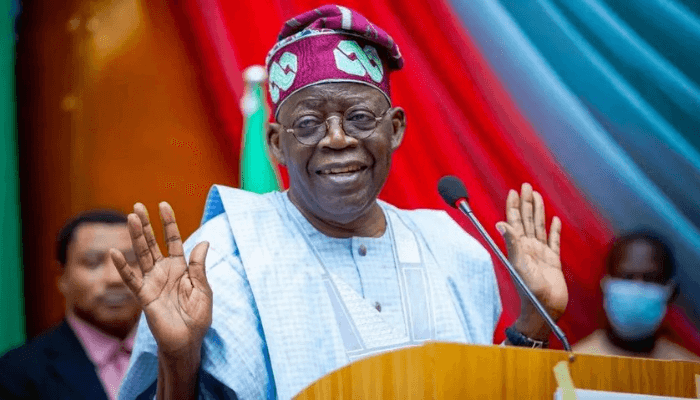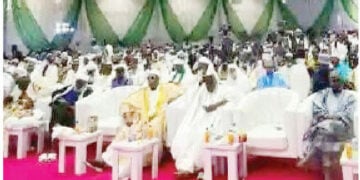Presidential Candidate of All Progressives Congress (APC), Asiwaju Ahmed Bola Tinubu, is not exactly a revolutionary; perhaps, just some kind of activist who easily turns into opportunist. His understanding of politics which automatically translates into his style of politicking is such that is fully suggestive of a desire and readiness to legitimately take advantage of existing and foreseen realities to achieve ambitions.
Since 1999 when he emerged as the Governor of Lagos State on the platform of the Alliance for Democracy (AD) which was registered as a political party by the General Abdulsalami Abubakar Abubakar-led military government on account of some other considerations than eligibility, Tinubu has successfully kept himself in the psyche of most Nigerians. The protracted struggle he and a lot of other Yoruba politicians carried out for the revalidation of the June 12 1993 presidential election which was earlier annulled by the military regime of General Ibrahim Badamasi Babangida perfectly served as a step towards the attainment of some political objectives.
Almost unarguably, after late Chiefs Obafemi Awolowo and Moshood Kashimawo Abiola, the next most popular Yoruba politician is Tinubu. In the last little less than two and a half decades, the former Lagos State Governor has been able to entrench himself as the leader of the Yoruba political class to whom most of the critical elements in the South-West defer; the same kind of privilege enjoyed by Awolowo and later Abiola.
Although, by a certain rating, he is considered as less inclined to any kind of ideology than Awolowo and equally less cosmopolitan than Abiola, the APC candidate is seen to have succeeded in the expansion of the frontiers of the South-West politics or, more precisely, Yoruba micro-nationalism. The clear homogeneity in the South-West which eases the process of harmonization of ideas has been the factor that continuously facilitates his consolidation as the leader of Yoruba politics.
There is currently a wide acknowledgement of the fact that Tinubu has successfully mainstreamed the regional politics of the South-West through the systematic incorporation of the Yoruba sentiments or political aspirations into the national political framework. The unquantifiable role he played in the formation of the APC on the platform of which Muhammadu Buhari emerged as Nigeria’s president in 2015 has already created the impression that he is now a national politician.
A lot of the past situations and events that eventually gave birth to APC have become advantages to Tinubu who, even before he announced his intention to run for the presidency, was widely believed to be a potential contestant. The manner in which he positioned himself for the contest fully pointed to the inevitably of his nomination as the presidential candidate of the ruling APC.
Tinubu and others like him in the APC are always boastful about its electoral victory, which they likened to a revolution. They have seemingly believed that the victory, in terms of the realization of key national objectives, is second only to the restoration of democracy to the country in 1999 and therefore always describe it as something that is worthy of continuous celebration.
Although those who know what revolution is and means for a country described the development in 2015 as a mere change of the party and personalities in power, the Tinubus have continued to insist that it was a Nigerian version of a revolution. The whole thing was a fundamental development to which the APC and all its key figures have continued to make reference as a strategy for the intimidation of the other parties, most particularly the Peoples Democratic Party (PDP) that directly lost power to it.
Even most recently, Tinubu somehow made this kind of reference when he stated that the next presidential election which he believes would be in his favour would be a “super revolution.” This means that, in terms of scope and impact, it would be far greater than the 2015 election which produced the present government.
It was during a campaign in Abeokuta, Ogun State, that Tinubu, after he decried the prevailing fuel shortage which, if not addressed, will be a threat to the conduct of the elections, called for a defiance against all the noticeable challenges by the voters so that the super revolution can be a reality. The huge confidence that he expressed over the readiness of Nigerians to participate in the elections is encouraging enough to give many other people the hope that the exercise will, after all, take place.
Yet, a lot of questions about the super revolution predicted by the APC candidate are being freely asked by either those who have never believed that a revolution ever happened in Nigeria or those who dismissed his statement as just an expression of anger over what he perceived as a deliberate attempt to quash his ambition to become president. The particular allegation he made that some forces are desperately trying to make the conduct of the elections an impossibility has shown the extent of his fury over the prevalence of the problems.
If one of the meanings of a revolution as explained in the 6th edition of Oxford Advanced Learner’s Dictionary and which is the most relevant to Nigeria is “a great change in conditions, ways of working, beliefs, etc, that affects large numbers”, then what happened in 2015 was definitely something else. Is it not because no such a change has occurred that the citizens are ceaselessly complaining about the current situation in the country?
Ordinarily, Nigerians would have begun to look forward to the super revolution that Tinubu predicted because most of them are fed up with the existing order that makes it difficult, if not impossible, for them to enjoy most of their basic rights. Having been visibly frustrated by the systems in operation, Nigerians will naturally appreciate and embrace any move that can bring about fundamental changes.
It is therefore because the Tinubu’s super revolution idea has not been adequately defined by him that not many people have understood it. The few varying interpretations to which it has so far been subjected are not enough to justify the necessity for it.
However, even though he is not a revolutionary as such, Tinubu comes across as a progressive politician whose orientation somehow signifies capacity for real actions and the intention to serve. It is not easy to just dismiss him as someone who has no any record of performance which can serve as a basis of some kind of judgement on his personality and politics.
As he continues with his campaigns, the APC presidential candidate is continuously expected to explain his super revolution theory so that Nigerians may know whether it is possible and needed or not. Such a better understanding will meaningfully determine the kind of attitude a lot of Nigerians will adopt to the forthcoming elections.





